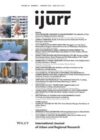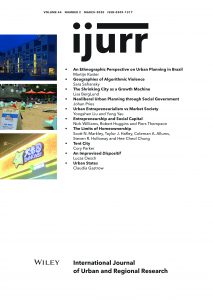Volume 44 Issue 2 March 2020
In This Issue...
Thinking from the heart of ‘social democratic welfare urbanism’, Pries draws attention to the ‘governmental formation’ that is ‘social neoliberalism’. Not unique to Sweden, the context for this article, social neoliberalism can be understood as a dominant formation at the present historical conjuncture. Several of the articles in this issue of IJURR provide insight into such regimes, from growth elites leading strategies of investment in ‘environments of extreme decline’ such as Detroit (Berglund) or the ‘entrepreneurial local state’ as an entanglement of market and society in China (Liu & Yau) or the mobilization of social capital as a technology of entrepreneurship in ‘deprived urban neighborhoods’ in Leeds (Williams et al.) or the consolidation of state power in Luanda, even where ‘the everyday experience of state capacity is one of absence or negligence’ (Gastrow). Also at stake in these articles is the question of methodology: which research methodologies and methods are needed to analyze practices of rule and regulation? Koster, for example, makes the case for the importance of ‘an ethnographic perspective on urban planning’, one that is attentive to ‘people’s time’. But the present historical conjuncture can also be understood, especially in the United States, as the renewal of racial capitalism. Safransky’s article on ‘geographies of algorithmic violence’ is a powerful exposition of the through-lines of racialized and red-lined space, now manifested in the seemingly new phenomenon of ‘data-driven planning’. In their article on space and wealth in Atlanta, Markley et al. thus expose the lie of ‘Black prosperity’, specifically Black homeownership, an important theme in the neoliberal optimism that runs through present-day narratives of Black capitalism. Such attention to segregation and exclusion finds prominence in the article by Parker on tent cities in Sacramento and by Oesch on Palestinian refugee camps in Jordan. These remind us of the ‘unsanctioned’ lives and spaces that lie at the very heart of racial capitalism.
— Ananya Roy
Articles
An Ethnographic Perspective on Urban Planning in Brazil: Temporality, Diversity and Critical Urban Theory
Published online on May 7th, 2019 | DOI: 10.1111/1468-2427.12765 (p 185-199)
Geographies of Algorithmic Violence: Redlining the Smart City
Published online on Nov 27th, 2019 | DOI: 10.1111/1468-2427.12833 (p 200-218)
The Shrinking City as a Growth Machine: Detroit’s Reinvention of Growth through Triage, Foundation Work and Talent Attraction
Published online on Feb 4th, 2020 | DOI: 10.1111/1468-2427.12858 (p 219-247)
Neoliberal Urban Planning Through Social Government: Notes on the Demographic Re‐engineering of Malmö
Published online on Feb 17th, 2020 | DOI: 10.1111/1468-2427.12870 (p 248-265)
Urban Entrepreneurialism Vs Market Society: The Geography of China’s Neoliberal Urbanism
Published online on Feb 28th, 2020 | DOI: 10.1111/1468-2427.12859 (p 266-288)
Entrepreneurship and Social Capital: Examining the Association in Deprived Urban Neighbourhoods
Published online on Mar 27th, 2018 | DOI: 10.1111/1468-2427.12589 (p 289-309)
The Limits of Homeownership: Racial Capitalism, Black Wealth, and the Appreciation Gap in Atlanta
Published online on Feb 17th, 2020 | DOI: 10.1111/1468-2427.12873 (p 310-328)
Tent City: Patterns of Informality and the Partitioning of Sacramento
Published online on Jan 17th, 2020 | DOI: 10.1111/1468-2427.12846 (p 329-348)
An Improvised Dispositif: Invisible Urban Planning in the Refugee Camp
Published online on Feb 17th, 2020 | DOI: 10.1111/1468-2427.12867 (p 349-365)
Urban States: The Presidency and Planning in Luanda, Angola
Published online on Jan 27th, 2020 | DOI: 10.1111/1468-2427.12854 (p 366-383)
Book Reviews
John Flint and Ryan Powell (eds.) 2019: Class, Ethnicity and State in the Polarized Metropolis: Putting Wacquant to Work. London: Palgrave Macmillan
Published online on Feb 28th, 2020 | DOI: 10.1111/1468-2427.12901 (p 384-385)
Brendan Murtagh 2019: Social Economics and the Solidarity City. New York: Routledge
Published online on Feb 28th, 2020 | DOI: 10.1111/1468-2427.12902 (p 386-387)
Jonathan Foster 2018: Stigma Cities: The Reputation and History of Birmingham, San Francisco and Las Vegas. Norman, OK: University of Oklahoma Press
Published online on Feb 28th, 2020 | DOI: 10.1111/1468-2427.12903 (p 388-389)
Paolo Boccagni 2017: Migration and the Search for Home: Mapping Domestic Space in Migrants’ Everyday Lives. New York: Palgrave Macmillan
Published online on Feb 28th, 2020 | DOI: 10.1111/1468-2427.12904 (p 389-390)
Matthew Vitz 2018: A City on a Lake: Urban Political Ecology and the Growth of Mexico City. Durham, NC: Duke University Press
Published online on Feb 28th, 2020 | DOI: 10.1111/1468-2427.12905 (p 390-391)
Hiba Bou Akar 2018: For the War Yet to Come: Planning Beirut’s Frontiers. Stanford, CA: Stanford University Press
Published online on Feb 28th, 2020 | DOI: 10.1111/1468-2427.12906 (p 392)
Nick Estes 2019: Our History Is the Future. London: Verso Books
Published online on Feb 28th, 2020 | DOI: 10.1111/1468-2427.12907 (p 393-394)
Issues in this volume
January 2020
March 2020
May 2020
July 2020
September 2020
November 2020

